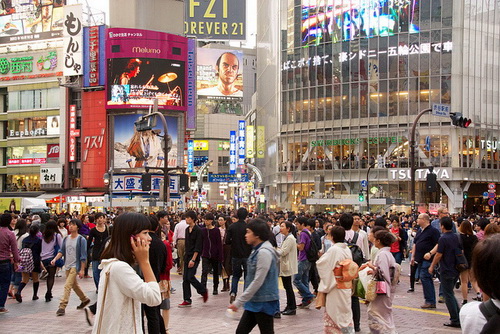As regular readers will know, I have recently returned from a trip to Japan. The only disappointment of a wonderful experience was Shibuya Crossing. This junction, famous from a thousand time-lapse montages, is known as “The Scramble”, after the moment when the lights change and thousands of people surge across.
The Scramble was disappointing because it seemed not only smaller in real life, but also extremely well organized. If you want to see a scramble, I thought, try crossing the Third Ring Road at Tuanjiehu: cars turning right at red lights, bikes and tuk-tuks edging forward into the flow of traffic, pedestrians wandering out more or less at random into a six lane road.
And this seemed to me to exemplify the most striking cultural difference between Japan and China (or Beijing at least): the level of courtesy and consideration to others. I’m not referring to the subjective social codes which govern eating, gift-giving, etc, but the simple fact that, no matter how busy the Osaka street or how crowded the Tokyo train, you are unlikely to be jostled.
It occurred to me that, for this to be possible, it requires the cooperation not only of jostler but of jostlee. When you’re trying to get off the subway, and someone is standing in front of the exit, apparently oblivious to your presence, there is often little choice but to barge your way past. I recently read a listicle entitled something like “20 things British people do”, and one of them was “touching your bag half an hour before your station so the person next to you knows you’re going to get off.” It is these discreet signals and unspoken codes which make it possible to live in a densely populated country without constantly bumping into each other.
As a parent, I worry about the impact on my children’s behavior. When we first arrived, my son was appalled that people didn’t apologize after knocking into him. Now, he jostles with the best of them. I theorized at first that physical contact was not seen as a big deal, and this was why no apology was considered necessary. Later however I learned that it may be an unlikely relic of Confucian traditions. In Confucianism you owe duties to those above you and below you in the hierarchy. Where there is no relationship, there is no duty, and so strangers effectively are treated as though they don’t exist.
Whether or not this is true, I will continue to try to instill in my children an awareness of and respect for those around them. When we return to England, I don’t want to have to shout, as I did so often in Japan, “Stop pushing! You’re not in Beijing now!”




